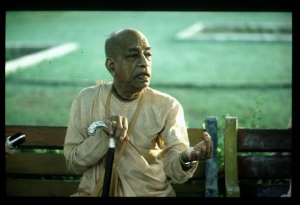SB 9.20.37: Difference between revisions
m (1 revision(s)) |
No edit summary |
||
| Line 1: | Line 1: | ||
{{info | {{info | ||
|speaker= | |speaker=Śukadeva Gosvāmī | ||
|listener=King | |listener=King Parīkṣit | ||
}} | }} | ||
[[Category:Srimad-Bhagavatam - Canto 09 Chapter 20]] | |||
[[Category:Bhagavatam Verses Spoken by Sukadeva Gosvami - Vanisource|092037]] | |||
<div style="float:left">'''[[Srimad-Bhagavatam]] - [[SB 9|Ninth Canto]] - [[SB 9|Ninth Canto]] - [[SB 9.20: The Dynasty of Puru|Chapter 20: The Dynasty of Pūru]]'''</div> | |||
<div style="float:right">[[File:Go-previous.png|link=SB 9.20.36]] '''[[SB 9.20.36]] - [[SB 9.20.38]]''' [[File:Go-next.png|link=SB 9.20.38]]</div> | |||
{{RandomImage}} | |||
==== TEXT 37 ==== | ==== TEXT 37 ==== | ||
<div | <div class="verse"> | ||
taṁ tyaktu-kāmāṁ mamatāṁ | :taṁ tyaktu-kāmāṁ mamatāṁ | ||
bhartus tyāga-viśaṅkitām | :bhartus tyāga-viśaṅkitām | ||
nāma-nirvācanaṁ tasya | :nāma-nirvācanaṁ tasya | ||
ślokam enaṁ surā jaguḥ | :ślokam enaṁ surā jaguḥ | ||
</div> | </div> | ||
| Line 17: | Line 22: | ||
==== SYNONYMS ==== | ==== SYNONYMS ==== | ||
<div | <div class="synonyms"> | ||
''tam''—that newly born baby; ''tyaktu-kāmām''—who was trying to avoid; ''mamatām''—unto Mamatā; ''bhartuḥ tyāga-viśaṅkitām''—very much afraid of being forsaken by her husband because of giving birth to an illegitimate son; ''nāma-nirvācanam''—a name-giving ceremony, or ''nāma-karaṇa''; ''tasya''—to the child; ''ślokam''—verse; ''enam''—this; ''surāḥ''—the demigods; ''jaguḥ''—enunciated. | |||
</div> | </div> | ||
| Line 24: | Line 29: | ||
==== TRANSLATION ==== | ==== TRANSLATION ==== | ||
<div | <div class="translation"> | ||
Mamatā very much feared being forsaken by her husband for giving birth to an illegitimate son, and therefore she considered giving up the child. But then the demigods solved the problem by enunciating a name for the child. | Mamatā very much feared being forsaken by her husband for giving birth to an illegitimate son, and therefore she considered giving up the child. But then the demigods solved the problem by enunciating a name for the child. | ||
</div> | </div> | ||
| Line 31: | Line 36: | ||
==== PURPORT ==== | ==== PURPORT ==== | ||
<div | <div class="purport"> | ||
According to Vedic scripture, whenever a child is born there are some ceremonies known as jāta-karma and nāma-karaṇa, in which learned brāhmaṇas, immediately after the birth of the child, make a horoscope according to astrological calculations. But the child to which Mamatā gave birth was begotten by Bṛhaspati irreligiously, for although Mamatā was the wife of Utathya, Bṛhaspati made her pregnant by force. Therefore Bṛhaspati became bhartā. According to Vedic culture, a wife is considered the property of her husband, and a son born by illicit sex is called dvāja. The common word still current in Hindu society for such a son is doglā, which refers to a son not begotten by the husband of his mother. In such a situation, it is difficult to give the child a name according to proper regulative principles. Mamatā, therefore, was perplexed, but the demigods gave the child the appropriate name Bharadvāja, which indicated that the child born illegitimately should be maintained by both Mamatā and Bṛhaspati. | According to Vedic scripture, whenever a child is born there are some ceremonies known as ''jāta-karma'' and ''nāma-karaṇa'', in which learned ''brāhmaṇas'', immediately after the birth of the child, make a horoscope according to astrological calculations. But the child to which Mamatā gave birth was begotten by Bṛhaspati irreligiously, for although Mamatā was the wife of Utathya, Bṛhaspati made her pregnant by force. Therefore Bṛhaspati became ''bhartā''. According to Vedic culture, a wife is considered the property of her husband, and a son born by illicit sex is called ''dvāja''. The common word still current in Hindu society for such a son is ''doglā'', which refers to a son not begotten by the husband of his mother. In such a situation, it is difficult to give the child a name according to proper regulative principles. Mamatā, therefore, was perplexed, but the demigods gave the child the appropriate name Bharadvāja, which indicated that the child born illegitimately should be maintained by both Mamatā and Bṛhaspati. | ||
</div> | </div> | ||
__NOTOC__ | |||
<div style="float:right; clear:both;">[[File:Go-previous.png|link=SB 9.20.36]] '''[[SB 9.20.36]] - [[SB 9.20.38]]''' [[File:Go-next.png|link=SB 9.20.38]]</div> | |||
__NOTOC__ | |||
__NOEDITSECTION__ | |||
Revision as of 09:36, 17 May 2021

A.C. Bhaktivedanta Swami Prabhupada
TEXT 37
- taṁ tyaktu-kāmāṁ mamatāṁ
- bhartus tyāga-viśaṅkitām
- nāma-nirvācanaṁ tasya
- ślokam enaṁ surā jaguḥ
SYNONYMS
tam—that newly born baby; tyaktu-kāmām—who was trying to avoid; mamatām—unto Mamatā; bhartuḥ tyāga-viśaṅkitām—very much afraid of being forsaken by her husband because of giving birth to an illegitimate son; nāma-nirvācanam—a name-giving ceremony, or nāma-karaṇa; tasya—to the child; ślokam—verse; enam—this; surāḥ—the demigods; jaguḥ—enunciated.
TRANSLATION
Mamatā very much feared being forsaken by her husband for giving birth to an illegitimate son, and therefore she considered giving up the child. But then the demigods solved the problem by enunciating a name for the child.
PURPORT
According to Vedic scripture, whenever a child is born there are some ceremonies known as jāta-karma and nāma-karaṇa, in which learned brāhmaṇas, immediately after the birth of the child, make a horoscope according to astrological calculations. But the child to which Mamatā gave birth was begotten by Bṛhaspati irreligiously, for although Mamatā was the wife of Utathya, Bṛhaspati made her pregnant by force. Therefore Bṛhaspati became bhartā. According to Vedic culture, a wife is considered the property of her husband, and a son born by illicit sex is called dvāja. The common word still current in Hindu society for such a son is doglā, which refers to a son not begotten by the husband of his mother. In such a situation, it is difficult to give the child a name according to proper regulative principles. Mamatā, therefore, was perplexed, but the demigods gave the child the appropriate name Bharadvāja, which indicated that the child born illegitimately should be maintained by both Mamatā and Bṛhaspati.